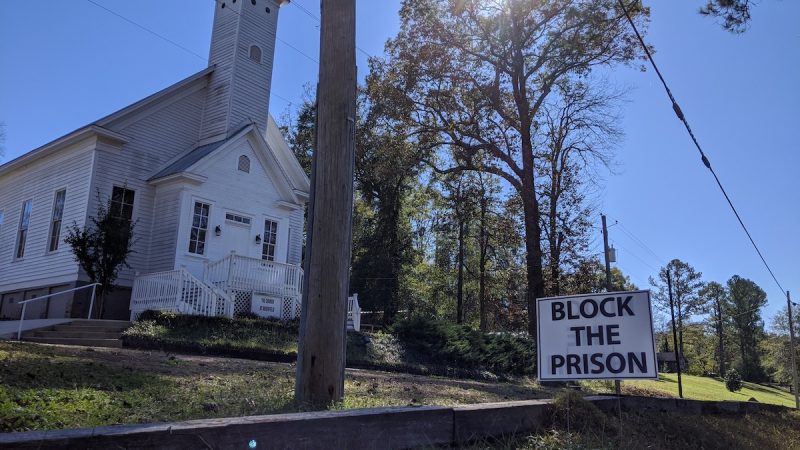Lawsuit aims to block Alabama from using COVID relief funds on prison project
A sign in Brierfield, Ala. opposing prison construction previously slated for the town. Photo taken Nov. 20, 2020.
More than 60 men incarcerated in Alabama filed a lawsuit on Monday against the U.S. Department of the Treasury, asking a federal judge to restrict the state from spending $400 million of its COVID-19 pandemic relief money on new prisons.
The move comes months after the Department of the Treasury issued guidance saying prison construction is a “generally ineligible” use of American Rescue Plan (ARP) funds.
The plaintiffs claim in the lawsuit that new buildings will not improve prison conditions and do not help communities recover from the pandemic. They also allege that Treasury officials are breaking the law by refusing to intervene and are asking a federal judge to step in.
“The Treasury has chosen to remain silent as Alabama defies the purpose of ARP by misappropriating approximately 20% of funds granted to Alabama … for prison construction,” Richard Rice, the lead attorney on the case, said in a statement.
Alabama officials previously said the rules did not affect their plans because the ARP funds were making up for lost revenue needed for prison construction.
They claim new correctional facilities will help alleviate widespread violence, overcrowding and understaffing in Alabama’s prisons for men, the subject of an ongoing lawsuit filed by the U.S. Department of Justice.
Several other states, including Mississippi and Louisiana, have also discussed using COVID relief money to build jails and prisons, though Alabama’s plans are among the most expensive.
The state will spend roughly $1.3 billion to build two mega prisons for men, combining the $400 million in ARP funds with roughly $500 million in bonds, which are expected to finalize Tuesday, plus additional money from the state’s general fund.
The lawsuit filed Monday is the latest attempt to halt the project. In recent weeks, incarcerated people and advocates have filed separate lawsuits and issued statements opposing the project.
To hear more about Alabama’s plan to build new prisons, check out WBHM’s podcast Deliberate Indifference.
This story was produced by the Gulf States Newsroom, a collaboration among Mississippi Public Broadcasting, WBHM in Alabama and WWNO and WRKF in Louisiana and NPR.
In Berlin, there are movies, there’s politics and there’s talk about it all
Buzz around whether the city's film festival would take a stance on the war in Gaza has dominated conversation in recent days.
Alex Ferreira wins 10th gold medal for Team USA, matching America’s highest total in Winter Olympics
Freeskier Alex Ferreira clinches a tenth gold medal for the U.S. in these Games, tying the U.S.'s all-time record for gold medals in a Winter Olympics.
Trump calls SCOTUS tariffs decision ‘deeply disappointing’ and lays out path forward
President Trump claimed the justices opposing his position were acting because of partisanship, though three of those ruling against his tariffs were appointed by Republican presidents.
The U.S. men’s hockey team to face Slovakia for a spot in an Olympic gold medal match
After an overtime nailbiter in the quarterfinals, the Americans return to the ice Friday in Milan to face the upstart Slovakia for a chance to play Canada in Sunday's Olympic gold medal game.
NASA eyes March 6 to launch 4 astronauts to the moon on Artemis II mission
The four astronauts heading to the moon for the lunar fly-by are the first humans to venture there since 1972. The ten-day mission will travel more than 600,000 miles.
Skis? Check. Poles? Check. Knitting needles? Naturally
A number of Olympic athletes have turned to knitting during the heat of the Games, including Ben Ogden, who this week became the most decorated American male Olympic cross-country skier.








